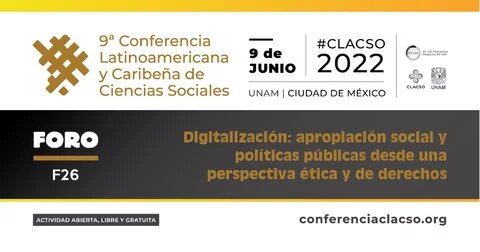In the framework of the 9th Latin American and Caribbean Conference of Social Sciences (CLACSO) "Inequalities in Latin America and the Caribbean: Knowledge, struggles and transformations", the forum "Digitalisation: social appropriation and public policies from an ethical and rights-based perspective" will take place on Thursday 9 June starting at 09:00 a.m. (CDMX time) // 16:00 (CEST) in Mexico City - Faculty of Dentistry, José Rojo Auditorium. The forum will be accessible also via live streaming.
The forum is organised by the EU-LAC Foundation and the CLACSO Working Group "Appropriation of digital technologies and intersectionalities". It is also supported by the Network of Researchers in Appropriation of Digital Technologies (RIAT) and coordinated by Ana Rivoir (University of the Republic, Uruguay), Anna Barrera Vivero (EU-LAC Foundation), Roberto Canales Reyes (Centre for Regional Development and Public Policy Studies, Chile) and Susana Morales (National University of Córdoba), Argentina. This forum, which will count with introductory remarks by Dr Adrián Bonilla, Executive Director of the EU-LAC Foundation, and Karina Batthyány, Executive Secretary of CLACSO, aims to address different aspects of the relationship between digitisation and the various levels of social life permeated by digital technologies.
In particular, it seeks to exchange perspectives, diagnoses and projections on the processes of digitisation in the field of education, with a particular focus on Latin America and the Caribbean, and Europe. The years 2020-2021 were characterised by the (partial) closure of schools, vocational training, and university institutions to limit the spread of the Covid-19 pandemic, which forced the deployment of a variety of experiences of transition to digital tools and forms of teaching and learning.
On the other hand, it is motivated by certain concerns shared by various social organisations, academic networks and governmental entities articulated in both regions, in relation to the risks and challenges of digitalisation, some of which were set out in the document "Access to technologies as a human right", produced by the Working Group Appropriation of Digital Technologies and Intersectionalities (CLACSO).
Based on the deepening of cooperation and the generation of a bi-regional agenda between Latin America and the Caribbean and Europe, it is proposed to advance in joint reflections and proposals aimed at the incorporation of digital technologies from an ethical, social cohesion, and rights perspective, adopting the principles established by the Sustainable Development Goals (SDGs) of the United Nations and the recently approved Recommendation on the Ethics of Artificial Intelligence (UNESCO).
Please be informed that the forum will be held in Spanish only. To access the detailed programme of the forum, see: https://conferenciaclacso.org/programa/foro_tematico.php?ca=37
